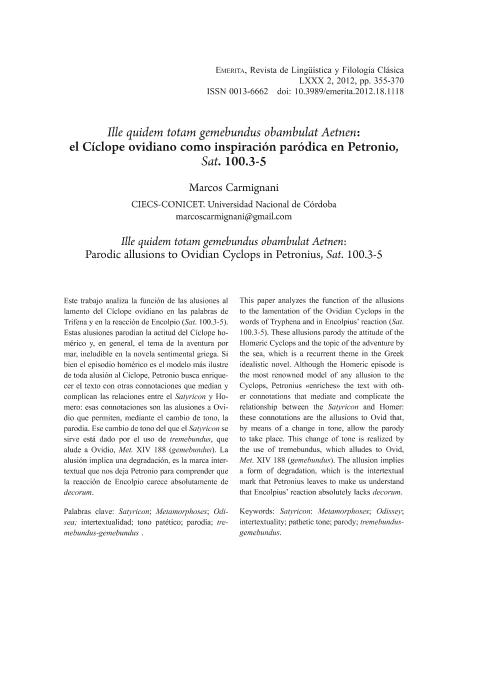Artículo
Este trabajo analiza la función de las alusiones al lamento del Cíclope ovidiano en las palabras de Trifena y en la reacción de Encolpio (Sat. 100.3-5). Estas alusiones parodian la actitud del Cíclope homérico y, en general, el tema de la aventura por mar, ineludible en la novela sentimental griega. Si bien el episodio homérico es el modelo más ilustre de toda alusión al Cíclope, Petronio busca enriquecer el texto con otras connotaciones que median y complican las relaciones entre el Satyricon y Homero: esas connotaciones son las alusiones a Ovidio que permiten, mediante el cambio de tono, la parodia. Ese cambio de tono del que el Satyricon se sirve está dado por el uso de tremebundus, que alude a Ovidio, Met. XIV 188 (gemebundus). La alusión implica una degradación, es la marca intertextual que nos deja Petronio para comprender que la reacción de Encolpio carece absolutamente de decorum. This paper analyzes the function of the allusions to the lamentation of the Ovidian Cyclops in the words of Tryphena and in Encolpius’ reaction (Sat. 100.3-5). These allusions parody the attitude of the Homeric Cyclops and the topic of the adventure by the sea, which is a recurrent theme in the Greek idealistic novel. Although the Homeric episode is the most renowned model of any allusion to the Cyclops, Petronius «enriches» the text with other connotations that mediate and complicate the relationship between the Satyricon and Homer: these connotations are the allusions to Ovid that, by means of a change in tone, allow the parody to take place. This change of tone is realized by the use of tremebundus, which alludes to Ovid, Met. XIV 188 (gemebundus). The allusion implies a form of degradation, which is the intertextual mark that Petronius leaves to make us understand that Encolpius’ reaction absolutely lacks decorum.
Ille quidem totam gemebundus obambulat Aetnen: el Cíclope ovidiano como inspiración paródica en Petronio, Sat. 100.3-5
Título:
Ille quidem totam gemebundus obambulat Aetnen: Parodic allusions to Ovidian Cyclops in Petronius, Sat. 100.3-5
Fecha de publicación:
12/2012
Editorial:
Consejo Superior de Investigaciones Científicas. Instituto de Filología
Revista:
Emerita. Revista de linguistica y filologia clasica
ISSN:
0013-6662
e-ISSN:
1988-8384
Idioma:
Español
Tipo de recurso:
Artículo publicado
Clasificación temática:
Resumen
Archivos asociados
Licencia
Identificadores
Colecciones
Articulos(CIECS)
Articulos de CENTRO DE INVESTIGACIONES Y ESTUDIO SOBRE CULTURA Y SOCIEDAD
Articulos de CENTRO DE INVESTIGACIONES Y ESTUDIO SOBRE CULTURA Y SOCIEDAD
Citación
Carmignani, Marcos Flavio; Ille quidem totam gemebundus obambulat Aetnen: el Cíclope ovidiano como inspiración paródica en Petronio, Sat. 100.3-5; Consejo Superior de Investigaciones Científicas. Instituto de Filología; Emerita. Revista de linguistica y filologia clasica; 80; 2; 12-2012; 355-370
Compartir
Altmétricas




